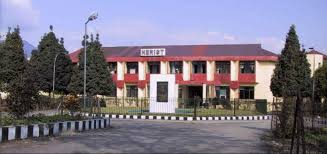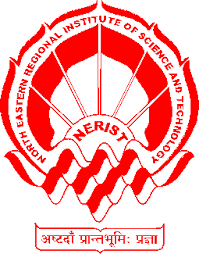
NORTH EASTERN REGIONAL INSTITUTE OF SCIENCE & TECHNOLOGY

ADDRESS:
North Eastern Regional Institute of Science and Technology (NERIST)
Nirjuli – 791109,
Papum Pare District,
Arunachal Pradesh, India
Description:
The North Eastern Regional Institute of Science and Technology (NERIST), situated in Nirjuli, Arunachal Pradesh, stands as a trailblazing institution within India’s northeastern region. With its distinct academic framework and an emphasis on science and technology, NERIST has evolved into a nexus for technical education and research, playing a vital role in the socio-economic advancement of the area.
Vision and Mission
Vision
NERIST aspires to be a premier institution in science and technology, spearheading sustainable progress and innovation in both the northeastern region and across the nation.
Mission
To deliver top-notch education and training in science, engineering, and technology.
To encourage interdisciplinary research and innovation that addresses regional and national issues.
To cultivate an entrepreneurial spirit among students, boosting the industrial and societal growth.
Campus and Infrastructure
NERIST’s campus spans an extensive area and is equipped with cutting-edge facilities tailored to meet the academic, research, and extracurricular demands of students and faculty.
Key Features
Academic Blocks: Contemporary classrooms and lecture halls fitted with audio-visual tools to enhance the teaching-learning experience.
Laboratories: Sophisticated labs for practical training in engineering, technology, and fundamental sciences.
Library: A comprehensive library housing an extensive collection of books, journals, and digital resources to assist academic and research pursuits.
Hostels: Safe and comfortable housing for students with all essential amenities.
Sports and Recreation: Facilities for both indoor and outdoor sports, a gym, and cultural activity centers.
Wi-Fi Connectivity: Rapid internet access throughout the campus to support e-learning and research activities.
Academic Structure
NERIST is celebrated for its progressive modular education system, which provides flexibility and accessibility for students from varied backgrounds.
Modular Education System
The institution adopts a three-tier modular framework that lets students enroll at different stages:
Base Module (Certificate): Comparable to Class 10 education, concentrating on fundamental skills in science and technology.
Diploma Module: A mid-tier program aimed at technical education and industry preparation.
Degree Module: Advanced studies culminating in undergraduate and postgraduate degrees in engineering, science, and management.
This structure allows students to leave the program with a certificate, diploma, or degree based on their goals and performance.
Schools and Departments
NERIST provides an extensive array of programs through its specialized schools and departments.
School of Engineering:
Departments: Civil Engineering, Mechanical Engineering, Electrical Engineering, and Computer Science & Engineering.
Programs: B.Tech, M.Tech, and Ph.D. in various engineering fields.
School of Basic Sciences:
Departments: Physics, Chemistry, and Mathematics.
Programs: B.Sc., M.Sc., and research opportunities in pure and applied sciences.
School of Management and Humanities:
Programs: MBA, M.A., and Ph.D. focusing on management principles, economics, and social sciences.
School of Agricultural Sciences:
Programs: B.Sc. and M.Sc. in Agriculture, fostering research in sustainable farming methodologies.
Research and Development
NERIST serves as a hub for groundbreaking research and innovation, tackling significant challenges in the region and beyond.
Research Focus Areas
Renewable energy and sustainable development.
Environmental protection and biodiversity.
Advanced materials and nanotechnology.
Artificial intelligence and data analytics.
Agricultural technology and food security.
Collaborations
The institute works in partnership with national and international organizations, industries, and government bodies to promote research and facilitate knowledge sharing.
Student Life
NERIST prioritizes the overall development of its students, encouraging involvement in a range of extracurricular activities and initiatives.
Clubs and Societies
Technical Clubs: Avenues for students to engage in robotics, programming, and engineering initiatives.
Cultural Clubs: Showcasing the rich heritage of the northeastern region through music, dance, and arts.
Sports Clubs: Coordinating inter-departmental and inter-college competitions to enhance physical fitness and teamwork.
Environmental Clubs: Programs aimed at sustainability and conservation efforts.
Events and Festivals
The institute organizes annual technical and cultural festivals, granting students a platform to exhibit their talents and connect with peers nationwide.
Placement and Career Development
NERIST has an active Training and Placement Cell striving to connect academia with industry.
Placement Highlights
Industry Links: Strong collaborations with esteemed firms for campus hiring.
Internships: Chances for students to acquire practical experience in their areas of study.
Career Guidance: Frequent workshops on resume writing, interview preparation, and career development.
Placement Drives: On-campus recruitment events attracting top organizations.
Admission Process
NERIST conducts a competitive entrance examination, NERIST Entrance Examination (NEE), for admissions into its various modules.
Eligibility
Base Module: Completion of Class 10 for the certificate program.
Diploma Module: Completion of Class 12 (Science) or equivalent.
Degree Module: Diploma in relevant fields or equivalent qualifications.
Admission Steps
Online application through the official website.
Performance in NEE and subsequent counseling for final seat assignment.
Community Engagement
NERIST is actively involved with local communities in Arunachal Pradesh and the northeastern region through various outreach initiatives.
Key Initiatives
Skill Development Programs: Educational programs for local youth in technical and vocational skills.
Awareness Campaigns: Initiatives focused on environmental preservation, health awareness, and education.
Courses/Programs
| Serial# | Title | Estimated Cost | Program type |
|---|
Campuses
Reviews
Average rating
0.0 / 5
Rating breakdown
Submit your review
